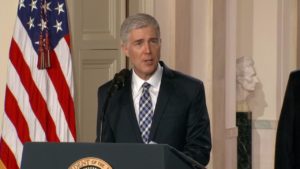by WorldTribune Staff, February 1, 2017
With the nomination of Neil Gorsuch to the Supreme Court, President Donald Trump accomplished his goal of replacing Justice Antonin Scalia with someone “very much in the mold” of the conservative champion, analysts say.
Trump on Jan. 31 chose Judge Gorsuch, of the U.S. Court of Appeals for the 10th Circuit, from a list of 21 individuals.

Gorsuch “is an eminently qualified and well-respected judge with a record that demonstrates he cares about religious liberty, the separation of powers, and the original public meaning of the Constitution and the laws he interprets,” The Daily Signal said in an analysis.
Gorsuch has critiqued the Left’s increasing preference to resort to the courts instead of the political process to advance its policy goals. In a 2005 op-ed, he wrote:
“American liberals have become addicted to the courtroom, relying on judges and lawyers rather than elected leaders and the ballot box, as the primary means of effecting their social agenda on everything from gay marriage to assisted suicide to the use of vouchers for private-school education. This overweening addiction to the courtroom as the place to debate social policy is bad for the country and bad for the judiciary.”
Trump’s nominee said that “… donning a robe doesn’t make me any smarter. But the robe does mean something … It serves as a reminder of what’s expected of us — what [Edmund] Burke called the ‘cold neutrality of an impartial judge.’ It serves, too, as a reminder of the relatively modest station we’re meant to occupy in a democratic society. In other places, judges wear scarlet and ermine. Here, we’re told to buy our own plain black robes.”
Before joining the bench, Gorsuch authored “The Future of Assisted Suicide and Euthanasia” (2006), a book that, as Princeton University Press described it, “builds a nuanced, novel, and powerful moral and legal argument against legalization [of assisted suicide and euthanasia], one based on a principle that, surprisingly, has largely been overlooked in the debate — the idea that human life is intrinsically valuable and that intentional killing is always wrong.”
Some of Gorsuch’s key legal positions:
- Hobby Lobby v. Sebelius: He distrusts efforts to remove religious expression from public spaces generally, but watch out for cases citing RFRA and RLUIPA — he ruled in Hobby Lobby v. Sebelius that the contraception mandate in Obamacare placed an undue burden on the company’s religious exercise and violated RFRA.
- Roe v. Wade: Gorsuch has never had the opportunity to write on Roe v. Wade. But, for any indication on how he would vote on abortions, the “right to privacy” defense from the dormant commerce clause is relevant, and he isn’t buying it. This clause, known as “dormant” since it is not explicitly written out in the Constitution, indicates that since Congress regulates interstate commerce, states cannot pass legislation that unduly burdens or discriminates against other states and interstate commerce.
- Second Amendment: He wrote in United States v. Games-Perez these rights “may not be infringed lightly.”
- Capital punishment: Gorsuch is not friendly to requests for relief from death sentences through federal habeas corpus.
- Criminal law: Gorsuch believes there is an overwhelming amount of legislation about criminal law, and believes that cases can be interpreted in favor of defendants even if it hurts the government. On mens rea — which means “guilty mind,” or essentially the intent to commit a crime — Gorsuch is willing to read narrowly even if it means it doesn’t favor the prosecution.
- Checks and balances: Gorsuch does not like deferring to federal agencies when they interpret laws, so watch out for use of the Chevron rule, which allows federal agents to enforce laws in any way that is not expressly prohibited. Gorsuch may push back.
